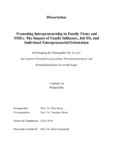Zitierlink:
http://dx.doi.org/10.25819/ubsi/10530Dateien zu dieser Ressource:
| Datei | Beschreibung | Größe | Format | |
|---|---|---|---|---|
| Dissertation_Koehn_Philipp.pdf | 2.19 MB | Adobe PDF |  Öffnen/Anzeigen |
| Dokumentart: | Doctoral Thesis | Titel: | Promoting intrapreneurship in family firms and SMEs: the impact of family influence, job fit, and individual entrepreneurial orientation | Sonstiger Titel: | Intrapreneurship in Familienunternehmen und KMU: Die Auswirkungen des Einflusses der Unternehmerfamilie, der Kompatibilität des Arbeitsplatzes und der individuellen unternehmerischen Orientierung | AutorInn(en): | Köhn, Philipp |
Institut: | Fakultät III - Wirtschaftswissenschaften, Wirtschaftsinformatik und Wirtschaftsrecht | Schlagwörter: | Intrapreneurship, Family Firms, Small and Medium-Sized Enterprises (SMEs), Intrapreneurship, Familienunternehmen, Kleine und mittelständische Unternehmen | DDC-Sachgruppe: | 330 Wirtschaft | GHBS-Notation: | QAA QAJE |
Erscheinungsjahr: | 2024 | Publikationsjahr: | 2024 | Zusammenfassung: | In the dynamic and complex markets of today, family firms and small-sized enterprises (SMEs) are under constant pressure to innovate their products, services, and internal business processes to preserve their competitive advantage and ensure longevity. Notably, many of such entities meet and even surpass the innovation criteria, despite often facing limited resources compared to non-family and/or larger corporations. This raises an intriguing question: how do these firms manage to be so innovative? A key driving force of their innovation is the entrepreneurial potential of their employees, better known as intrapreneurship. Defined as the entrepreneurial behavior and activities undertaken by employees within their organizations, intrapreneurship is widely recognized to enhance innovation outputs and subsequently improve firms' performance. Therefore, identifying the factors that promote intrapreneurship in family firms and SMEs carries considerable theoretical and practical significance. However, while numerous studies have investigated various antecedents of intrapreneurship, little attention has been devoted to family firms and SMEs. This lack of focus is surprising, given their significant differences compared to non-family and/or larger corporations, suggesting unique triggers for intrapreneurship in these organizations. For example, the family business literature emphasizes the influence of the enterprising family, known as family influence, on a firm's behavior and decisions. This family influence delineates family firms from non-family ones, thus making it a dominant subject in family business research in recent years. Despite different studies investigating the impact of family influence on aspects such as innovations, strategic and financial decisions, or succession within family firms, empirical studies examining its relationship with intrapreneurship are severely lacking. Additionally, family influence has only been measured from the perspective of the enterprising family, while the perspective of non-family employees, who are building the most dominant stakeholder group within many family firms and therefore, frequently subjected to family influence, has been notably overlooked in measuring family influence. This research contributes to fill this gap, considering that understanding the perception of family influence is critical to better grasp this concept, particularly in the context of family firms. Intrapreneurship studies in SMEs are lacking, too. Despite the understanding that a pleasant and satisfying working environment nurtures intrapreneurship, and SMEs being acknowledged for their aptitude in tailoring their workplaces to accommodate their employees' needs, the specific impacts of these conditions on employee intrapreneurship remain largely unexplored. Thus, it is highly relevant to examine the impact of the alignment between an actual job and employees' personalities, demands, and needs, in the literature known as job fit, on employees’ intrapreneurial activities. To address these gaps, this dissertation is based on three consecutive studies. The first qualitative study explores how the influence of the enterprising family on the firm affects the intrapreneurial motivation of non-family employees. The findings highlight that significant family influence fosters strong identification of non-family employees with the family and the firm, positively driving their intrapreneurial motivation. In contrast, firms with reduced family influence report decreased identification among non-family employees, prompting such firms to establish mechanisms, such as monetary rewards, to stimulate extrinsic intrapreneurial motivation. The second study develops and validates the Perceived Family Influence Scale (PFIS), a pioneering instrument measuring family influence from the perspective of non-family employees allowing for the gathering of more holistic and comprehensive data. The third study quantitively examines the relationship between individual entrepreneurial orientation, job fit and employee intrapreneurship. The results indicate that individual entrepreneurial orientation positively influences employee intrapreneurship, while job fit has no significant effect on it. However, the results also show that the person-organization fit, and the demands-abilities fit have a leveraging effect on the positive relationship between individual entrepreneurial orientation and employee intrapreneurship. The contributions of this dissertation are manifold. First and foremost, it offers valuable insights into intrapreneurship within under-researched contexts such as family firms and SMEs. It highlights two intra-organizational factors, family influence, and job fit, that, either directly, such as family influence, or via moderation effects, such as job fit, promote intrapreneurship. Thus, this manuscript advances the discourse on intrapreneurship and innovation in family firms and SMEs and encourages further research in these areas. Secondly, the thesis introduces the PFIS, the first-ever scale measuring family influence from the perspective of non-family employees. This novel instrument enables researcher to collect more comprehensive and holistic data on family influence. This expands the knowledge on family firms, ultimately advancing the family business research stream. Last but not least, the PhD provides relevant practical contributions for firms, irrespective of their size, financial resources and/or structure, aiming for increased innovation outputs through intrapreneurship. Such firms are recommended to leverage the principles of family influence, such as strong and personal relationships with employees, and job fit revealed in this dissertation. |
DOI: | http://dx.doi.org/10.25819/ubsi/10530 | URN: | urn:nbn:de:hbz:467-27430 | URI: | https://dspace.ub.uni-siegen.de/handle/ubsi/2743 | Lizenz: | http://creativecommons.org/licenses/by/4.0/ |
| Enthalten in den Sammlungen: | Hochschulschriften |
Diese Ressource ist urheberrechtlich geschützt. |
Seitenansichten
375
checked on 15.01.2025
Download(s)
166
checked on 15.01.2025
Google ScholarTM
Prüfe
Prüfe
Diese Ressource wurde unter folgender Copyright-Bestimmung veröffentlicht: Lizenz von Creative Commons


